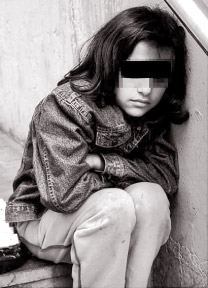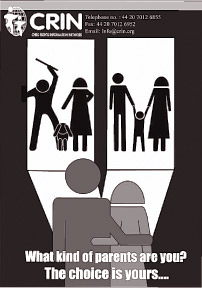Breaking the culture of silence on sexual abuse
Reza Hossaini-UNICEF Representative
In recent weeks the news media seems to have reported on an
increasing number of cases of sexual violence against children. This
phenomenon has sparked an eclectic mix of responses from all parts of
the political spectrum; responses that have been genuinely constructive,
and some which have been less so.
The line of discourse has mainly been if the recent increase in trend
is the result of better monitoring and reporting or because of an actual
surge in incidences of sexual violence against children. The truth is we
do not know, as neither have been properly studied, yet. Sadly, there
has been too little consideration of what can be done to effectively
prevent, respond rapidly to and protect the child victims.
 |
|
Stop child
abuse |
The menace of abuse, including sexual violence against children, is a
gross violation of children’s rights. Yet, it is a global reality across
all countries and social groups. It takes the form of sexual abuse,
harassment, rape or sexual exploitation in prostitution or pornography.
Lack of legal protection
In the 2006, the UN Secretary General’s report on violence against
children reported that violence against children exists in every country
in the world, whatever the culture, ethnic group or background they are
from. And it doesn’t matter whether their families are well-educated or
not, rich or poor. Violence can take place anywhere.
What’s more, even though it is clear to most people that children
have rights, and need to be protected from violence so that they can
grow up to be healthy adults, many countries allow violence against
children to take place because lack of legal protection, poor
implementation of the legislations, culture of acceptance, or because it
is commonly used as a punishment.
According to the World Health Organization, it is estimated that 150
million girls and 73 million boys under 18 were forced to have sex or
experienced other forms of sexual violence during 2002. It is quite
likely that these figures are grossly underestimated because of fear of
reporting, stigma attached to and with reporting, sexual abuse
considered as normal in a society or in the cases of sexual abuse in the
institutions they are not simply recorded and reported.
Can’t we use these recent heartrending cases reported in the media to
break the culture of silence that has even turned into a culture of
acceptance in some communities?
Childhood innocence
Some years ago, I was asked to say a few words at the funeral of a
six-year-old girl and her eight-year-old brother. Both had mercilessly
been tortured for months and eventually killed by their stepmother.
On my way to the ceremony, I was thinking to myself what do I have to
say to the grieving members of the families and friends, should I talk
about childhood innocence? But then everyone knows children are a gift
of god.
Should I talk about the inhuman act and the cruelty of a sick
stepmother? Instead I talked about how we as a society let down two
innocent and defenceless children.
Their father betrayed them by not seeing and picking up the signs of
anguish and pain in their faces. Their neighbours let them down by not
listening to their sounds of their screams and cries.
Acceptance and impunity
The health care workers failed them by not asking about the unusual
repeated bruises and broken bones. And the school and teachers failed
them for not noticing the repeated absence from classes.
 Sadly, as a community and society we all had a role in preventing the
death of those children. We did not play our part. Unfortunately for
some children there is no safe place to live as sexual violence can take
place in different settings. Sadly, as a community and society we all had a role in preventing the
death of those children. We did not play our part. Unfortunately for
some children there is no safe place to live as sexual violence can take
place in different settings.
Far too often, children experience the worst forms of violence at
home, by the very same people who are supposed to protect them. Children
are at risk in school and institutions such as children homes and
orphanages too.
A few months ago, I heard of the story of a 13-year-old girl who had
been raped by her own father. After spending few months in a safe home
she was sent to an orphanage while the father is freely going about his
daily business. How can a society allow an innocent child’s rights to be
violated so repeatedly? How do we allow a victim to pay the ultimate
price, her freedom?
We may never be able to put an end to violence against children but
we can certainly put in place systems that help reduce the incidence and
prevent the secondary violation of children’s rights.
First, there is a need to break this culture of silence and social
taboo. As a first step we need to acknowledge that, like anywhere else
in the world, the children of Sri Lanka are also exposed to sexual
assault, violence and incest.
We have to plan for an awareness-raising campaign targeted the public
but more specifically at the key influencers and actors at the community
level.
The teachers, health workers, GN leaders have a major role in not
only raising awareness on telltale signs of sexual harassment but they
also have a responsibly to monitor and report.
Children themselves should be made aware of the danger signs and they
should know of people or places where they can trust and go to when
faced with such situations.
Zero tolerance policy
The government and local institution should have a zero tolerance
action plan for sexual violence. These plans should be widely
distributed among the institutions like schools, Police department and
community. This zero tolerance should also include the culture of
impunity which is believed to greatly contribute to the continuation of
sexual violence.
Each institution that deals with children should have a zero
tolerance policy on sexual violence for its staff and, should be
strictly monitored.
A coordinated mechanism is needed for responding, following up and
completion of inquiries into cases of sexually abused children. Justice
delayed is justice denied, sadly, for a great majority of these children
the delays in justice come at a great cost, including losing out on an
entire education and growing up fearless in a caring family environment.
Academic institutions should join hands with the government sectors
to review and study not only the scale of the problem but also help in
designing effective policies and programmes for combating sexual
violence and abuse.
Last but not least, creating a protective environment for children
requires everyone’s active engagement. No government in the world, no
matter how strong or committed, can address this issue on its own. A
caring and well informed family, neighbourhood and community are the
first and foremost lines of defense, and government institutions, social
services providers and NGOs are of paramount importance in both
prevention and response. A declaration of zero tolerance in the work
place as well as at home and in the community, both for government and
private sector employees, will be essential for the fight against sexual
violence and abuse.
|



